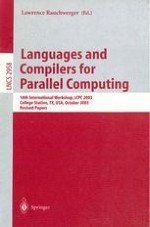2004 | OriginalPaper | Chapter
Memory Redundancy Elimination to Improve Application Energy Efficiency
Authors : Keith D. Cooper, Li Xu
Published in: Languages and Compilers for Parallel Computing
Publisher: Springer Berlin Heidelberg
Included in: Professional Book Archive
Activate our intelligent search to find suitable subject content or patents.
Select sections of text to find matching patents with Artificial Intelligence. powered by
Select sections of text to find additional relevant content using AI-assisted search. powered by
Application energy consumption has become an increasingly important issue for both high-end microprocessors and mobile and embedded devices. A multitude of circuit and architecture-level techniques have been developed to improve application energy efficiency. However, relatively less work studies the effects of compiler transformations in terms of application energy efficiency. In this paper, we use energy-estimation tools to profile the execution of benchmark applications. The results show that energy consumption due to memory instructions accounts for a large share of total energy. An effective compiler technique that can improve energy efficiency is memory redundancy elimination. It reduces both application execution cycles and the number of cache accesses. We evaluate the energy improvement over 12 benchmark applications from SPEC2000 and MediaBench. The results show that memory redundancy elimination can significantly reduce energy in the processor clocking network and the instruction and data caches. The overall application energy consumption can be reduced by up to 15%, and the reduction in terms of energy-delay product is up to 24%.
